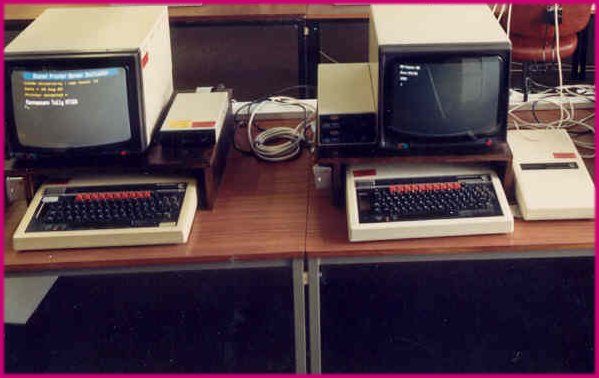| Title: |
The BBC Micro and its Legacy - a special CCS seminar |
| Speakers: |
John Radcliffe, George Auckland, Steve Furber, Mike Bostock and others |
| Date: |
20th March 2008 |
| Time: |
14.30 Room is open from 13.30 for an exhibition of BBC micro hardware - more details soon. |
| Location: |
Fellows Library of the Science Museum, Exhibition Road, London, SW7 2DD |
|

BBC Micros at Leeds University |
About the Seminar
25 years after its launch in January 1982 the Computer Conservation Society is holding a seminar exploring its legacy. This special event will bring together many of the people who took part in the original projects. The four themes and lead speakers are:
- The role of the micro within the BBC Computer Literacy Project - the genesis, scope, and impact of the project, and the role of the Micro within it.
The lead speaker is John Radcliffe, the Executive Producer for the BBC Computer Literacy Project. His talk will include a showing of some BBC programme extracts (by Paul Kriwaczek, who produced “The Computer Programme”), and a brief technical account the BBC Micro (by one of the Acorn team who designed it).
- Its legacy for the BBC - Micro applications, telesoftware, Domesday, and further innovations.
The lead speaker is George Auckland, Head of Learning Innovation at the BBC. He will talk about the legacy of the system - and the Project - for the BBC.
- Its technological legacy - ARM processor applications, the Cambridge phenomenon, computer architecture research.
The lead speaker is Steve Furber, CBE, Professor of Computer Engineering at the University of Manchester, and one of the key designers of the BBC Micro. He will talk about its technological legacy, the ARM microprocessor, now the world’s dominant architecture for mobile and embedded systems, the ‘Cambridge phenomenon’ – the active cluster of companies and investors and the mobile work-force that together fuel the local high-tech economy, and the legacy for computer architecture research.
- Its educational legacy - Computer hardware and software in schools, standards and applications.
The lead speaker is Mike Bostock who was one of the small group of key educational advisers who ran the MEP project in the 1980s, and exercised great influence on the use of the BBC Micro and other systems of the day in schools and colleges. He will talk about the educational impact, its ease of use in schools, the take-up of hardware and software, innovation and consolidation, BBC Micros, Macs and PCs, and the continuing influence today of the 1980s generation of teachers.
The talks will be followed by discussion, chaired by David Hartley. We expect this to be a full afternoon’s event – to 5pm.
We also plan to have an exhibition of hardware before the seminar, with items from the Science Museum and The National Museum of Computing.
Speakers
See above about the main speakers. We also expect other members of the original project to contribute.
Background
For more about the BBC Micro and its use click here to see the Wikipedia entry.
For more about the BBC computer literacy project, click here for a BBC report which details the project and its achievements between 1979 and 1983. This comprehensive report has 52 pages. (Note this may take some time to download - it is a large PDF document - 7.5MB)
Click
 to see a podcast of this event.
to see a podcast of this event.
|
|
|
|
